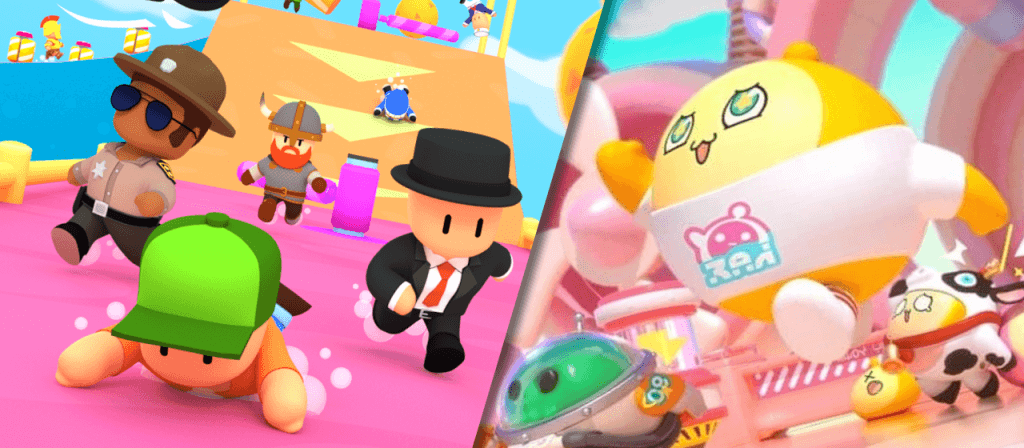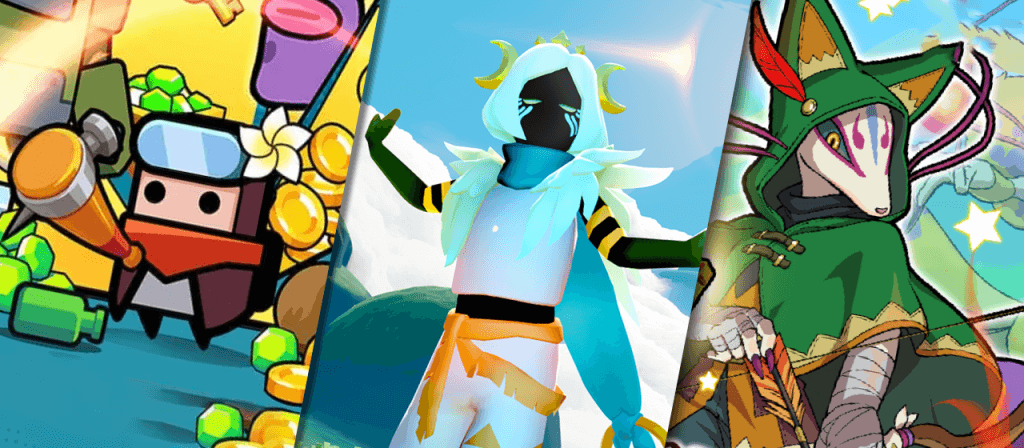What trends and features to look forward to in 2023? In this episode of the Mobile GameDev Playbook, we’re joined by Wilhelm Voutilainen and Teemu Palomäki, Chief Game Analysts from GameRefinery, a Liftoff Company, to discuss key trends in 2023.
![]()
![]() Spotify, BuzzSprout, TuneInRadio, iHeartRadio
Spotify, BuzzSprout, TuneInRadio, iHeartRadio
– If you enjoy the episode, remember to hit subscribe!
We discuss upcoming releases, potential new genres, and exciting trends. We also cover shooter games, predictions for monetization changes, events trends, and what will happen with blockchain games in 2023.
You can also watch the episode on YouTube:
Topics we will cover in this episode:
- Introduction
- What mobile games to look out for in 2023?
- 2022 was a tricky year for casual games. How’s 2023 looking like?
- Shooters have been a hot area over the last year or so
- IP trend will continue in 2023
- What does the future of gachas look like?
- Have we yet to see every iteration of Battle Pass possible? Clearly not
- Everyone wants to avoid App Store fees
- The popularity of subscriptions in mobile games has grown
- As games become more social, cosmetic monetization grows in popularity
- In-game event trends
- The biggest blockchain game teams have been silently developing their games
Read transcript
Introduction
[00:00:02] Jon Jordan: Hello, and welcome to the Mobile GameDev Playbook. Thanks for tuning in for another episode. This is a podcast all about what makes a great mobile game, what is and isn’t working from our game designers and all of the latest trends. I’m your host, Jon Jordan, and in today’s episode, we are looking forward to what’s going to be happening in the mobile game space in 2023, so that’s going to be fascinating. We have two experts to help us with their top-level views on what’s going to be going on in trends and what games we should be looking out for. We have Wilhelm Voutilainen, who’s a chief game analyst at GameRefinery by Liftoff. How’s it going, Wilhelm?
[00:00:35] Wilhelm Voutilainen: Doing good. Thanks for asking, Jon.
[00:00:38] Jon: Good. Obviously, you’re full of the Christmas spirit with your lights going. Also, I have Teemu Palomäki. How’s it going, Teemu?
[00:00:48] Teemu Palomäki: Doing great. Great to be here.
[00:00:49] Jon: Good, good. As you point out, you are also a chief game analyst at GameRefinery by Liftoff. We have many Chief game analysts there because you’re all experts. I will kick straight into what’s going to go on. Many trends are always going on, but the things that drive trends are the products coming out. What games should we be looking out for in 2023?
What mobile games to look out for in 2023?
[00:01:14] Teemu: I’ll start with some exciting RPG games that I’m looking forward to, as well as from the professional side. To begin with, Final Fantasy VII Ever Crisis. Final Fantasy VII is, obviously, one of the most famous console games out there. What they are doing is they are remaking that game and all the Final Fantasy VII compilation stuff into a mobile game. That’s relatively unheard of. It’s a mix of art styles and a chibi art style on the map. Final Fantasy VII remakes graphics, so it’s a weird combination, but it’s going to be interesting to see how that turns out.
That’s one to look out for. Then currently released in Japan, is a mobile game version of Fullmetal Alchemist, a popular manga IP released in Japan to celebrate its anniversary. It’s almost the 20th anniversary. It’s a high-quality, high-production value game. Since that was launched late this year, it should be coming about a year later in the West if their usual patterns apply here. Then from the western side as well, with a Chinese twist, there’s an open-world version of Assassin’s Creed in the works. It’s an open-world mobile RPG taking place in 215 BCE China. It looked high quality when we last saw the content of it. It’s interesting to see if that will make it to next year’s releases. Wilhelm is more into these, but Warcraft Arclight Rumble is also a beautiful game.
[00:03:40] Wilhelm: Yes, it’s exciting. It’s mixing Clash Royale mechanics but having PvE and other RPG stuff. I’m personally really looking forward to that one.
[00:03:56] Teemu: One last game that comes to my mind, something that I’ve been playing in soft launch, is Clash Mini from Supercell. It’s the last one standing of the recent Supercell soft launches, as they had Everdale and Clash Quest, which got buried, so it’s interesting to see if this one will end up standing. It’s been one year now since the soft launch. It’s quite a fun game, but interesting to see if it’s good enough for Supercell.
[00:04:41] Wilhelm: Yes, and of course, those were just RPGs. Of course, we have lots of other examples, like shooters. Lots of new shooters are coming in, possibly in 2023. Of course, everybody knows Call of Duty Warzone mobile is coming. It’s interesting as it has this cross-progression Battle Pass and the PC version. It’s also interesting to see how it will do compared to the Call of Duty mobile already in the market.
Of course, from other massive shooter IPs, we have VALORANT Mobile possibly coming, bringing a different kind of more tactical and slow-paced gameplay compared to rapid and fast movement shooters that we have right now in the mobile. Rainbow 6 Mobile is likely coming, same for Battlefield Mobile. Then another interesting one is from the developers of Garena Free Fire. We have Garena Undawn, which is an open-world zombie survival shooter.
We have seen some successful open-world zombie survival games in the Asian market, but this is interesting to see how these will do within Western markets. Now you have this shooter gameplay to that as well. Then we have Sausage Man, one of China’s most successful Battle Royale games. We have that also coming to the Western market, so it’s interesting to see if we see more goofy casual games will work in Western shooter markets. Of course, we have Avatar Reckoning, which Teemu knows more.
[00:06:35] Teemu: Yes, I recently watched the first movie of the blue Avatar characters, and it’s entertaining. It takes me to a new world separate from what I usually see. I’m curious to see this game since it’s a shooter game where they are wearing tactical vests. It’s the guns that are the selling point of that IP. Interesting to see how that lands, especially after the new movie comes later this month.
[00:07:17] Wilhelm: Yes, and then, of course, the racing genre is finally getting some action as well. We have Racing Master, a stunning-looking racing game from NetEase. This could be something that revives the racing genre on the western market. Of course, we also have Kart Rider Drift, a sequel to the successful Kart rider games, which are incredibly successful in China. There’s also some location-based stuff like NBA All-World coming from Niantic. Interested to see if there could finally be some successful location-based thing other than Pokemon GO, but yes, we’ll see.
[00:07:59] Jon: Cool, that’s quite a list. Some other ones will be either known or unknown at the moment, but most of those we categorized as midcore type games. As we’ve discussed in other podcasts, 2022 was generally tricky for casual games. There may be reasons for that. How will that change in 2023 for those games that are always very popular, always will have mass appeal, and go hard on monetization? Where do they go this year?
2022 was a tricky year for casual games. How’s 2023 looking like?
[00:08:40] Wilhelm: Yes, that’s a fascinating question because, as you say, most of the new top 200 grossing games this year were mid-core and not casual. There were few casual games. If there were new super successful casual games, they were something new. For example, it just hit the top 100 grossing, Match 3D. It’s a unique Match 3 game. There could be some new genres that could grow, like merge, that could be something we could see growing.
Some exciting games that haven’t hit the top-grossing charts but appear a lot in them, and are more ad-monetized, are these idle arcade games that combine hyper casual with RPGs and these title crafting mechanics. Those are super unique, and I like the gameplay in those games. We could see hybrid genres like this moving more from ad monetization towards IP Monetization.
The problem is in ad targeting. In 2023, the most successful new casual games are these hybrid casual, idle arcade games. Of course, we have seen the significant current trends in casual. I’m yet to see somebody try to make a similar game to, let’s say, Match Masters, which has been a massive success. This game is a pure PvP Match 3. Could we see games like that? Maybe. Of course, mini-games have been monumental in casual. We could see more mini-games focused games, platforms for mini-games or games like Township, where half the game is a crafting game and the other half is just playing different mini-games and mini-game payments. For example, renovation is saturated already. I need to see that more new renovation games could be that successful. Tapping on those other trends could be the way.
Shooters have been a hot area over the last year or so
[00:11:10] Jon: Most definitely the last year, we spent a lot of time talking about hybridization and games becoming entire platforms and all these mini-games, but nothing to do with the main game coming in. That trend may continue. Some great designers could come out with something from nothing that makes it a big success, but over time, it becomes harder to have new things because everything’s been done in some way.
You’ve got into detail about shooters, which has been one hot area over the last year or so. How’s that shooting market going? Is that very competitive? Are there a certain number of people who want to play shooters, and all the games compete for the same audience? Or is that an audience we still think is growing in terms of the people who would play shooters?
[00:12:03] Wilhelm: Successful games like PUBG Mobile and COD Mobile brought new players to mobile and made the whole shooter space bigger. However, just pure battle royale shooter games are not highly saturated, and only a few new battle royale games are coming to top-grossing genres. Call of Duty Warzone could be one carried by massive modern existing IP.
Looking at the success on PC and mobile and other markets, we have seen many different kinds of shooters. We still have space for RPG, Looter, and PvE shooters in the Western markets, one of which is Garena Undawn. That could be successful, in terms of that there’s space for that.
Moving to hero shooters, so games like Overwatch, a game called T3 Arena released in the US market. For a short while, it reached the Top 200 Grossing. That could mean that some big studio could make a hero space shooter, maybe even Overwatch mobile. That could work well. Then these more Counter-Strike style shooters and the VALORANT style shooters will still be based for those as well.
Then lastly, the extraction shooter, so Escape from Tarkov-like games. We have recently seen this with new Chinese games whose names I cannot pronounce. It’s in the Top 100 grossing in China markets, and it’s an extraction type of shooter with a different kind of gameplay compared to the other shooters. You enter that match, you loot, and there are PvE mobs and other players. If you die, you lose your loot. It gives this rogue-like vibe. There would also be space in the western market for this kind of shooter.
[00:14:21] Jon: What tends to happen, especially with that last example, is you have games that are hits, but they bring a new atmosphere in. They start with very niche audiences, and then over time, people work out how to take what is a shooter. Still, it has this new tension. Do you want to keep going into the level to get more loot but risk dying and losing progression, or get extracted earlier?
[00:14:50] Wilhelm: The monetization aspect in those games is also really interesting. For example, this Chinese game is the only mobile game where monetization works like you make in-app purchases for items, then enter a match, and you can lose the item. No other mobile games can lose items you have purchased. It works for them. They’re monetizing super well in the China market.
IP trend will continue in 2023
[00:15:15] Jon: Underpinning a lot of the stuff we’ve been talking about so far is either external IP or leveraging existing game IP. Again, in 2022, we’ve seen a lot of big games using existing IP and being quite successful around that. That trend is going to continue. Is it almost impossible to have a starting-from-scratch mobile game with no IP attached, whether it’s an external media or coming off an existing game franchise? Is that space just being squeezed?
[00:15:55] Wilhelm: Looking at, especially the last six or seven months of this year, the new top 200 grossing games, a massive percent of those, especially in mid-core, are IP-based games. We went through the list of the hottest new games coming in 2023. Almost every single game was either an IP-based game or a sequel to an already existing, big mobile game. It will be hard to do well in mid-core without an IP. It could be easier in casual and is in casual casinos, as well.
[00:16:44] Jon: Part of that plays into what we discussed last year: the inability to target and find the people who would monetize your game. IP makes it much more manageable. You’re paying a cost upfront, or there’s some, whether internal or external, giving you leverage to widen your immediate audience, which helps you on the marketing side.
That was the top-level stuff, and we’re going to dig into some feature-level trends. One thing that every business wants to know about monetization. We’ve got quite a few bits on monetization. I’m going to kick off with gacha, which is ever popular. Where are we going with gacha? Indeed, there can’t be any more complicated gacha mechanics. They’ve all been done by this stage.
What does the future of gachas look like?
[00:17:47] Teemu: It’s going to be interesting to see where it evolves because, just a week or two ago, we got news from Australia that they will possibly make loot boxes or gachas adults-only content, so completely prohibited from minors. Belgium and the Netherlands already have some limitations and some bans there. It’s interesting to see where it evolves. MARVEL SNAP was recently released, and it has more transparent monetization. They don’t have gachas at all. It is interesting to see how that game can succeed if others will copy similar monetization models.
We’ve recently had a few games removing gacha elements, which is rare. We had Mario Kart Tour that took out their monetized gachas. There are still randomized rewards as part of Battle Pass and daily rewards, but you can’t sink your money into the gachas. There’s a daily rotating shop, and you can choose what you want to buy. Similarly, Brawl Stars and other better-performing games removed their gacha mechanic from the end-game level-up system.
Then just recently, they announced that they would be eradicating gachas or boxes and have this massive campaign like “okay, now is the last time to get these boxes and then they will be gone”. They have yet to announce the replacement, but it was some progression system. The more you play, the better characters you can unlock. It will be interesting to see how that works out for them. If this is a trend, that will continue to the following year because gachas are getting hate from players and governments. Interesting to see where gachas will evolve.
[00:20:40] Wilhelm: Yes, gachas will probably be one of the most interesting feature trends in 2023. As Teemu already mentioned, many gachas are getting removed. However, possibly going into the following year, we have also seen the trend go the other way. Some gacha types are becoming more popular in some games and genres.
Talking about casual games, we have also seen the special gacha mechanics coming to this genre. For example, Coin Master has often used these event-tied special box gachas. Box gacha is a gacha where you have a small pool of items. Each time you pull something out of the gacha pool, it gets removed. You only have to do a certain amount of pulls to get the gachas. Then the price points get big at the end, so it monetizes efficiently.
Playrix’s games have also started using gachas, like Homescapes. Then talking about the new gacha types. Each year there seems to be one huge gacha trend. This year we saw preview gachas emerge. This year, we’ve already seen engagement gachas becoming more popular. Engagement gachas are tapping into those same benefits that Battle Passes bring. It works as an engagement feature but also as a monetization feature. We have games like Pokémon UNITE, Diablo Immortal, and Hearthstone, all bringing this engagement gachas. For example, Hearthstone brought their new gacha. You have to purchase the key to the gacha, and then you have to win an Auto Chess match, and then you get to open the gacha. There’s this engagement in the middle. These will probably become more popular as more big games utilize this.
[00:22:52] Jon: That’s interesting. Going back to your initial point, Teemu, it was interesting. Yes, you’re right. Belgium brought in laws saying that gachas were gambling, so you could do it, but you needed a gambling license. No gaming company wanted to deal with that. They pulled it all out of Belgium. That was a few years ago now. At the time, everyone was going to start pulling it out and not have it restricted to the Netherlands and Belgium. It’s always the thing that if a big market starts bringing in legislation, then everyone has to make a change.
What we see is that Mario Kart probably wasn’t monetizing very well for the players of Mario Kart. In that case, it makes sense for someone like Nintendo. They’re not making much money, so they position themselves as “we’re against gachas”. The problem for most people is that’s the critical part of your monetization. That’s just that mechanic, or that random mechanic is so powerful psychologically. I think legislation will only ban them if you can see the tension in there.
Maybe you’re saying, Wilhelm, that having an engagement gacha means you’re protecting yourself because people aren’t just randomly throwing money. You wouldn’t buy loads of keys if you weren’t going to do the work and then play through it. In that case, you’re getting the best of both worlds because you’re getting the committed players who want it. You’re stopping people who may not have such good self-control and just buying things for the sake of it.
It’s a fascinating interaction between game design and social, moral, and ethical thoughts, and all this monetization. I want to keep an eye on it. Good. I think probably maybe even more prevalent in our podcast series last year, Battle Passes. Surely, again, what else can be done with Battle Passes? Have we yet to see every iteration possible? Clearly not.
Have we yet to see every iteration of Battle Pass possible? Clearly not
[00:24:55] Wilhelm: Yes, Battle Passes are so popular already, so I see them becoming less prevalent in the next year. Different iterations, similar that there have been other unique gacha mechanics in gachas. These new iterations of Battle Passes will become more popular. We’ve already seen a lot recently, like in Lily’s Garden, one of the top Match 3 games. They added this new gacha mechanic to their Battle Passes plan. In some Battle Passes rewards, you have a specific time to play to get to the reward, or you will lose it on the premium tiers.
You have 15 minutes to get to the next level, and you will double your reward if you can play that progress at Battle Pass in the required amount of time. In Call of Duty Mobile, they added that you can purchase the old Battle Passes you still need to complete. That’s a unique and exciting way as well. Making those items feel more or less rare, some players might think, okay, if they are adding old Battle Passes, should I purchase the next Battle Pass plan? It’s hard to say if that’s a super good way of implementation or not, but definitely a unique and interesting one.
[00:26:21] Jon: It’s interesting. It’s like putting in like we’re just discussing with the gachas almost, you’re building what was a hard monetization feature, and you’re building engagement in there. You’re encouraging people to go from the free Battle Pass to the paid Battle Pass because you have more optionality. That’s going to be an underlying trend to all that stuff.
What else have we got? Okay, so avoiding App Store fees. Everyone wants to avoid App Store fees. That could be quite a big thing here with all the ongoing still epic stuff and Apple and Google having to dismantle certain parts of the App Store. What should developers consider to get their audiences to avoid paying App Store fees for buying stuff?
Everyone wants to avoid App Store fees
[00:27:03] Teemu: Well, web stores, those are interesting. Those have been popping up ever since the court battles that Apple has been having. Some more prominent companies started going first, testing the waters a little bit but then increasing their presence in the web stores. For example, Supercell started with just a Clash of Clans web store. You could buy the clan Battle Passes there. Then they saw that it was good because they added Hay Day, and with Hay Day, you can purchase a foreign pass and premium currency.
Most recently, they added Brawl Stars there. You can buy premium currency in Brawl Stars. It’s all done through the Supercell ID. You can also donate what you buy in the web store to other players in your friends’ list in the Supercell ID. It’s cheaper for the player. It’s 10% cheaper to buy from the web store and for the developer. If Apple takes a 30% cut, it’s a win-win situation if the players find the web store. Another interesting one is that State of Survival recently added a 4X game where you can buy premium currency. Usually, you can only buy up to a hundred dollars in the game. But, their web store had something for almost $900.
If you want to invest in the game, web stores are best. Though for them, it’s only 5% cheaper in the web store compared to the game. It’s more than just a mid-core thing, as the last example, YAHTZEE with Buddies by Scopely. Their Web store is next level. The first time you log into the web store, you get a gift for your game. The store also has a loyalty system that is just web store exclusive. The more you buy from the web store; you accumulate these loyalty points that you can use to exchange for additional items in the game. They’re going hardcore into the web store thing.
[00:29:48] Jon: It’s fascinating. When I heard Supercell doing it, I was surprised because this is just developers just doing this and not cutting a deal with Apple to do this. This seems to be people just doing, “Well, we can do it.”
This seems to be the beginning of the end for the App Store’s 30%. Even if you’re getting 5% off, 5% for someone spending thousands of dollars a month will be significant enough for them not to do it through the App Store. That’s the saving money versus the ease of use.
[00:30:32] Teemu: For the most committed players, web stores will be a great deal, but most players probably end up purchasing impulsively through the game.
The popularity of subscriptions in mobile games has grown
[00:30:47] Jon: Similar in terms of the App Store monetization being taken down brick by brick, we’ve seen quite a lot around subscriptions, in general, for the last couple of years.
[00:31:00] Wilhelm: Yes, this is a similar subject to that. There were web stores and not avoiding, but reducing, those App Store fees. These auto-renewing sub-plans will definitely gain popularity. Of course, games already have, at least, what they like to call sub-plans in the game, like monthly cards. You make the in-app purchase at one price point, and then you get benefits for the whole month, but it’s not renewing. It doesn’t go through the actual system, the app stores or the Google Play existing sub-region system.
For those subscription plans, almost 50% of games in the US use these monthly card systems. Of those, only 17.5% of the top 200 across the US are utilizing these auto-renewing subscription plans. The huge benefit of these auto-renewing subscription plans is that Google takes only 15% of cuts on these plans. For Apple, it’s the same, 30% for the first year, but it’s only 15% years after that. There are massive benefits to utilizing that auto-renewing subscription plan. I think that will also gain much popularity in the next year.
[00:32:23] Jon: It’s not rocket science to combine the last two things we discussed. Subscription plans going through a web store are great for the developer and potentially suitable for the player if they save on the fees. Cosmetic monetization, what do we mean by that?
As games become more social, cosmetic monetization grows in popularity
[00:32:45] Wilhelm: The things to monetize within the game and what is actually monetized. Focusing a bit on the core gameplay and the pay-to-win monetization, I see cosmetic monetization gaining more popularity in the next year.
There are two types of this. First, we have games that add cosmetic monetization to their existing core monetization. Like Match 3, that are monetized with boosters and retry/continues. On top of that, they are adding some cosmetic items that they can monetize with.
Also, games are already heavily monetized with cosmetics, such as most shooters, for example. I see them adding more ways to monetize with those cosmetics and boost the value of those cosmetics inside the game. I’m going to give you a couple of examples here. Garena Free Fire, for example, is primarily a cosmetic-monetized game, but recently, they have been adding this more value to watching those cosmetics through this. For instance, they added this Trend Plus feature, an in-game collectables album, which makes these cosmetic item sets and these bundles into actual in-game clothing brands. You’re collecting these cool in-game brands, tapping out to this sort of real-life fashion trend as well. Also, they just added this new cosmetic item type.
I will see these new cosmetic item types getting added more to this. They added this customizable cosmetic item. First, you purchase that, so that the skill for your character and then additionally collect and purchase different styles like different colors and stuff like that. You also get rewarded for completing those different collections on top of that. Also, an excellent example of Match 3s where core gameplay monetization-focused game adding more cosmetic monetization is Lilly’s Garden. On top of their core gameplay monetization, they have added these cosmetic character skills that you can purchase directly or through the Battle Pass plan.
Also, they just added these renovation element schemes as well. Usually, you can choose from those three different renovation elements when you are playing the core game. Usually, those are free, but there are only a few to choose from. Then you can get additional unique ones to the Battle Pass plan. Of course, you are also boosting that Battle Pass monetization through those. Those are two really interesting examples, and I see that stuff gaining popularity in the next year, for sure.
[00:36:15] Jon: Generally, buying digital items was seen as very odd five years ago. You might do it as a funny quirk to buy a hat in a game, or there’s a whole thing of you buying Christmas hats or something for a dollar, whereas, now, it’s not weird. For a younger age group, that looks pretty normal. They spend a lot of time in games or online universes.
Why wouldn’t you have spent tens of dollars buying the things you like in those worlds? That’s playing into that as well. Interesting, you say about collecting fashion, you’re building up sets of that, then completing the set and getting more rewards. All these things are tied to the overall progression of the game and the in-game sort of experience.
[00:37:09] Wilhelm: As all of these games are becoming more and more social, adding more social features and becoming just more and more social experiences, that itself also boosts the effects or the strength of those cosmetic items. If you tap on that with monetization, that is an excellent way to success.
In-game event trends
[00:37:32] Jon: Cool. Okay, so that’s monetization done. Next, we’re going to look at event trends. LiveOps events are the things that drive people to stay in games and stay retained, and come back and engage. What are the big trends there? We’ve already spoken about mini-games. Every game has mini-games. Where do mini-games sit next year?
[00:37:59] Teemu: Well, mini-games are, of course, very popular. Many companies try out fake ads and implement the most popular ones in their games. We have all seen those, and many games add them nicely, and people enjoy them; X-HERO was doing pretty well with mini-game style content, first in their ads and the game. People got into the game that way. That will continue, and I don’t see that going anywhere.
We’ve seen a lot of these mobile games restating the same events over and over again. You have the same mechanics for Christmas, Halloween, or Thanksgiving. Recently we’ve seen more games try to be unique with their events. For example, to illustrate the point, Cookie Run Kingdom, what they’ve done with their latest collaboration with the Korean Boy Band BTS, brought in a new rhythm gameplay infused with their normal core gameplay. That is something that we had yet to see in the game before. Now that they are celebrating Christmas, they brought in a cake decoration event. Something that they haven’t done before, it’s unique, and characters are coming in; they tell you what kind of cake they want, and then you decorate the cake according to the instructions to get the rewards. To avoid players getting bored or finding the game too repetitive, more and more games will try to mix things up and bring new events now and then to spice up their calendars. That’s one bigger trend.
[00:40:30] Jon: Key to those things is knowing your audience. From having BTS in a cake decoration game, I assume that Cookie Run Kingdoms is skewing slightly more female, but this could be wrong. The point is that you’re engaging your core audience.
[00:40:51] Teemu: The core audience might be surprised by what they like. I’ve been playing the game daily. The cake decoration might be a miss for me, but I never knew I would be this invested in BTS. Cookie Run Kingdom has surprised me.
[00:41:08] Jon: Seeing a new side to you, Teemu. Okay, alternative gameplay elements. What’s going on there? What does it mean even?
[00:41:18] Wilhelm: Yes, it is a similar trend to these mini-games, but I would not categorize them just as mini-games. It’s basically bringing this alternative gameplay from other genres to the game, usually not permanently, usually just through events. A perfect example is League of Legends: Wild Rift. It’s been bringing in a couple of bigger events with these light RPG mechanics, where you collect these story event characters and develop them.
These light RPG mechanics make those events feel different and feel like they would have much more depth than just having simple task events. Homescapes just had this merge event. If players love merge games, why don’t we also have a recurring merge event in the game?
On top of those trends, competition events in casual have been trending for a couple of years. That trend will continue in the next year as well. The Candy Crush games have been bringing lots of direct PvP elements and stuff like that. I think I talked earlier about the Match Masters direct PvP game; we’ll see this in more casual games, probably in events. Events are a great way to try out new mechanics and see what your players would like.
[00:43:17] Jon: We mentioned IP earlier on in the podcast, but one thing about IP is it is very flexible. We have games based on IP, but also we have this collaboration between IP, which has been prevalent in places like Japan for over a decade. We’re seeing that more globally now that IP is not seen as a fix; here’s a box where the IP has to sit within that box, and you’re very inflexible. IP is now everywhere.
[00:43:52] Wilhelm: IPs have been trending heavily; collaborations events and IP-based things in the game have been trending heavily. The trends themselves and also the game developers have noticed that it’s just super beneficial for both. For the games, it’s either a great way to boost engagements, monetize with or even both.
We have seen games like Garena Free Fire bringing this permanent, so instead of just having collaboration events, they have been bringing permanent IP-based characters to their game. The game has almost ten different IP-based characters, like Justin Bieber. We have Cristiano Ronaldo. Recently, they just added a famous Thai actress there as well. Of course, the game is huge in Thailand, so that’s quite clever.
Of course, from the brand view, more and more big brands want visibility in the games. Roblox is a great example. Many of the biggest brands in the world already have their own worlds and games inside Roblox. To them, it feels like a no-brainer that they want to have this visibility inside games. Games are massive.
There are games like Roblox with so many players and stuff like that. Of course, it’s different compared to, let’s say, you are running an ad in a game compared to having an actual world that the players can interact with or that the players can see that, okay, hey, this person is playing as this super cool version of Justin Bieber, for example. Of course, that boosts the Justin Bieber trend as well.
The biggest blockchain game teams have been silently developing their games
[00:45:56] Jon: Yes. Cool. Good. Then I hesitate to mention this last point because it’s been going on for a while. I’m going to keep my mouth shut. I’m going to let you guys talk. It’s been around a little bit in 2022. We’ve not seen it have any eventuality or massive impact. Where do blockchain and Web3 sit in mobile?
We’re not sure about the most interesting bit: Apple has formally released some terms and conditions about how you can use NFTs in the App Store, which we didn’t have before. Some people are very excited about that, and others think Apple is doing it all wrong. We have yet to find out because we’ve not seen any great examples. To finish up quickly, is that going to be different? Is it just going to be one that we don’t know how it will pan out?
[00:46:48] Wilhelm: 2021, of course, it was the hottest trend ever to make a blockchain-based game and have blockchain mechanics in your game. 2022, of course, has been silent in terms of new releases. The biggest blockchain game teams have been silently developing their games. 2023 could be interesting. We could see some at least big-name games already getting released in 2023.
Well, it’s also fascinating to wait and see. First, the first genuinely successful blockchain games or games that utilize blockchain technology will not be these play-to-earn games because, as we have seen, those can be hard to sustain with the market situation being super bad and stuff like that. It will be more, especially the successful ones; we use these play-and-own games where it’s a gameplay-first blockchain games.
You can play the game without ever knowing it has any blockchain. You don’t need to interact with it if you don’t want to. I think games like that. Then it’s just a normal game, but you can own your assets if you want to. One good example I want to throw, for sure, is Highrise. It’s a mobile-first game, which has added NFT technology on top of that. Grossing-wise, it’s doing extremely well. It’s still in the top 200 grossing. You can play the game without ever touching that blockchain stuff, but if you want to, you can own your own assets and sell them whatever. Highrise is an excellent example of a successful blockchain-based or blockchain technology-utilizing game.
[00:49:08] Jon: Some of the stuff we’ve been talking about on the monetization side is interesting. It’s a small jump, particularly now Apple have put down some formal rules about how they want to deal with digital assets. You can see that potentially being another monetization layer for particularly engaged audience members. They can get some of these things for free or work their way up and buy some of these NFTs now using in-app purchases. It just becomes another layer. You have the free layer, the paid layer, and the blockchain layer. We will see. Certainly, yes.
Publicly, there are quite a lot of the big mobile publishers that have announced strategies in this field. We’ve yet to see much actuality, but we will see. It will be something to keep your eye out on in 2023, amongst everything else. We’ve covered an awful lot of stuff today. Wow. Well done, guys. That’s a lot of research. Thanks to Wilhelm and Teemu. Thanks for coming on and kicking off 2023 in style. Thanks, guys.
[00:50:10] Wilhelm: Thank you.
[00:50:12] Teemu: Thank you.
[00:50:13] Jon: Thanks for watching and listening to the podcast however you are consuming it. In every episode, we’re delving into what’s going on in the mobile game sector, which, as you can see, is extremely vibrant still. It’s still the biggest sector in gaming, still growing first and underpinning all these different technologies and different layers on how to make games and build mass audiences. I hope you come back to every episode. I hope you are learning as much as I am from all this expertise. See you next time. Bye.




















